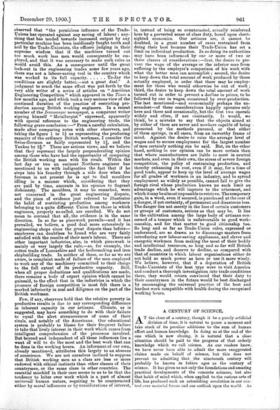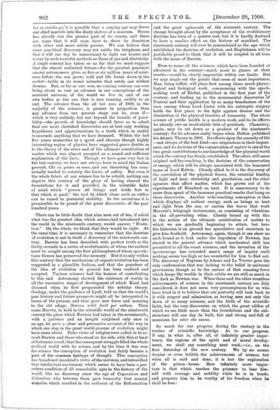A CENTURY OF SCIENCE.
AT the close of a century, though it be a purely artificial division of time, it is natural to pause a moment and take stock of its peculiar additions to the sum of human effort and human knowledge. In doing so at the end of the one which is now closing, it is natural that a close attention should be paid to the progress of that orderly knowledge which we call science. As our readers know, we have never been able to admit the more exaggerated claims made on behalf of science, but this does not prevent us admitting that the nineteenth century will probably be known in future ages as the century of science. It has given us not only the foundations and amazing practical developments of the concrete sciences, but also that habit of mind which, when applied to the various arts of life, has produced such an astonishing revolution in our con- trol over material forces and our outlook upon the world. As far as results go:it is possible that a coming age may throw our chief marvels into the dusty shelves of a museum. Steam has already run the greater part of its course, and there are signs that it will soon have to share its dominion with other and more subtle powers. We can believe that some psychical discovery may yet outdo the telephone, and that it will one day be unnecessary to light our houses and towns by such wasteful methods as those of gas and electricity. A single century has taken us so far that we must suppose that the almost unlimited future—for the greatest pessimist among astronomers gives us five or six million years of exist- ence before the sun grows cold and life burns down in the socket—holds in its womb miracles that outdo our wildest dreams. But, so far as one sees, no coming century can ever bring about so vast an advance in our conceptions of the material universe, of the world we live in, and of our own bodies as the one that is now running swiftly to an end. The advance from the all but zero of 1800, in the majority of the sciences, is greater in proportion than any advance from our present stage can be, even if— which is very unlikely, but not beyond the bounds of possi- bility—the growth of knowledge should force us to admit that our most cherished discoveries are at best only working hypotheses and approximations to a truth which in reality transcends anything that we have dreamed. Within the last five years researches in a irvel and obscure though highly interesting region of physics have suggested grave doubts as to the theory of the ether and of the ultimate constitution of matter which was almost accepted as a sound and sufficient explanation of the facts. Though we have gone very fast in the last century, we have not always born in mind the Italian proverb, Chi va piano va Bono, and our theorising has occa- sionally tended to outstrip the limits of safety. But even if the whole fabric of our science has to be rebuilt, nothing can deprive this century of the glory of having cleared the foundations for it and provided, in the scientific habit of mind which "proves all things and holds fast to that which is good," the tool by which alone such an edifice can be raised to perennial stability. In the meantime it is permissible to be proud of the great discoveries of the past hundred years.
There can be little doubt that nine men out of ten, if asked what was the greatest idea which science had introduced into the world in the nineteenth century, would answer, "Evolu- tion." On the whole, we think that they would be right. At the same time, it is necessary to remember that the doctrine of evolution is not in itself a discovery of the nineteenth cen- tury. Darwin has been described with perfect truth as the thirty-seventh in a series of evolutionists, of whom the earliest must be sought among the first philosophers of whose specula- tions Greece has preserved the memory. But it is only within this century that the mechanism of organic evolution has been suggested in a plausible fashion, and that the grandeur of the idea of evolution in general has been realised and accepted. Various sciences had the honour of contributing to this end. Astronomy showed the existence of worlds in all the successive stages of development of which Kant had dreamed when he first propounded the nebular theory. Geology, under the guidance of Lyell, told us that the world's past history and future prospects might all be interpreted in terms of the present, and thus gave new force and meaning to the old adage, Natura nihil facit per &ilium. Then came Darwin, to hold in the scientific world of the nineteenth century the place which Newton had taken in the seventeenth; with a patience and an insight conjoined only once in an age, he gave a clear and persuasive account of the way in which one step in the great world-process of evolution might have come about. False views of religion were called in to as- sault Darwin and those who stood at his side, with this at least of fortunate result, that the consequent straggle filled the whole civilised world with its echoes, and by the time it was won for science the conception of evolution had fairly become a part of the common heritage of thought. This conception has broadened mankind's views of the universe, and intensified that intellectual excitement which seems to have been a pre- cedent condition of all remarkable ages in the history of the world, like no discovery since the age of Copernicus and Columbus, who between them gave humanity that mental stimulus which resulted in the outburst of the Reformation
and the great upheavals of the sixteenth century. The change brought about by the acceptance of the evolutionary doctrine has been of a quieter sort, but it is hardly destined to have a smaller effect on the history of mankind. The nineteenth century will ever be remembered as the age .which established the doctrine of evolution, and Englishmen will be justifiably proud to think that it will be coupled to all time with the name of Darwin.
Even to name all the sciences which have been founded or advanced in the century—much more to glance at their results—would be clearly impossible within our limits. But we may single out the points that seem of most importance. Man, being selfish, will place first among these much physio- logical and biological work, commencing with the epoch- making work of Bichat, published in the first year of the century, and leading up to the monumental discoveries Of Pasteur and their application by so many benefactors of the race, among whom Lord Lister with his antiseptic surgery holds the first place, to the fight against disease and the diminution of the physical troubles of humanity. The whole science of public health is a modern work, and to its efforts we already owe an incalculable debt of gratitude. Chemistry, again, may be set down as a product of the nineteenth century; for its advance really began when Dalton published his Atomic Theory in 1803. Its effects upon the amenity of life —not always of the best kind—are stupendous in their import- ance, and its doctrine of the conservation of matter is one of the two great contributions to our knowledge of the physical world which the century has firmly established. The other, still more original and far-reaching, is the doctrine of the conservation of energy, which will be always associated with the honoured name of Lord Kelvin. Closely allied to it is the discovery of the correlation of the physical forces, the essential kinship of light and heat, electricity and gravitation, and the other agencies that affect matter, which has grown out of the experiments of Rumford on heat. It is unnecessary to do more than speak of the immense practical results that hung on these discoveries. Another wide-reaching conception is that which displays all radiant energy, such as brings us heat and light from the sun, or carrier; the waves that work Marconi's telegraph instruments, as consisting of vibrations in the all-pervading ether. Closely bound up with this is the notion of the ultimate constitution of matter to which we are gradually beginning to attain, but here the historian is on ground too speculative and uncertain to give him foothold. Astronomy, again, though it can show no such bound as it took under the impulsion of Newton, has shared in the general advance which mechanical skill has permitted to all the exact sciences, and the invention of the spectroscope has extended man's range of inquiry until nothing seems too high or too wonderful for him to find out. The discovery of Neptune by Adams and Le Verrier gave the only confirmation that was lacking to the belief in universal gravitation, though as to the nature of that amazing force which keeps the worlds in their orbits we are still as much in the dark as Newton was. When these and the other countless achievements of science in the nineteenth century are duly considered, it does not seem very presumptuous for us who have lived in it to believe that our posterity will look back to it with respect and admiration, as having seen not only the dawn of so many sciences, and the birth of the scientific habit, but the very discoveries on which the great edifice pf which we see little more than the foundations and the sub- structure will one day be built, fair and strong and full of mansions for color che sanno.
So much for our progress during the century in the realms of scientific knowledge. As to our progress, if any, in what is, after all, of infinitely greater impor- tance, the regions of the spirit and of moral develop- ment, we shall say something next week,—i.e., on the first Saturday of the new century. We by no means despise or even belittle the achievements of science, but when all is said and done, it is but the exploration of the prison - house. How infinitely more impor- tant is that which teaches the prisoner to bear him- self with courage and nobility while he is in bonds, and prepares him to be worthy of his freedom when be shall be free!



































 Previous page
Previous page